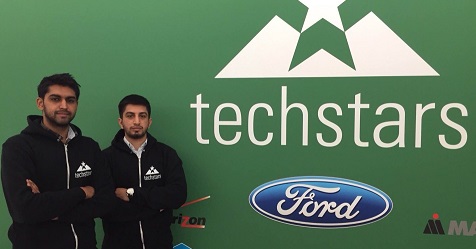Yashin Shah and Shiva Bhardwaj want to bring the predictive capabilities of airplane systems to your car, and they’ve been working with the Techstars accelerator in Detroit to fulfil that dream.
Shah and Bhardwaj are the co-founders of Ansik, a Waterloo-based startup developing products that help the auto servicing industry. Starting two years ago, they have developed an income stream with ShockLock, a clamp that keeps the hood open while mechanics work on the engine. And now they’re working on PitStop and predictive diagnostic system for car engines.
“When an issue in a vehicle occurs, it’s already too late [to fix on the spot],” said Bhardwaj, the company’s CEO, in a recent interview. “We had to bring predictive diagnostics to it. By the 1990s, the aerospace already had predictive diagnostics in their systems. … Now that there is connectivity in vehicles, we want to leverage on that.”
PitStop uses a diagnostic plugin and a smartphone app to link a car, the car owner and the service station. The hardware in the car can predict a problem is about to happen so the owner and service station can address it immediately rather than when the car breaks down. It also allows service stations to send out maintenance notices, quotes and coupons to their customers.
The two University of Waterloo grads had been working on the project at the Velocity Foundry, and in May they took advantage of an extraordinary opportunity. TechStars, the global network of accelerators, had established a program in Detroit for startups involved in the auto industry, and Ansik was in the first cohort.
The program benefited from about 150 mentors, as well as the cooperation of such blue-chip companies as Ford, Magna International, Verizon Telematics, Dana Holding, and Honda R&D Americas.
Having gone through TechStars Detroit, Ansik emerged with a product that can pull together data and use machine learning to diagnose three main problems with a car: failed head gaskets, failed air bag modules and failed O2 sensors.
The company is now running a pilot program with four large auto dealerships, and is working with fleet managers and two original equipment manufacturers, or OEMs, based in Michigan: Roush Performance and Danlaw. The goal is that as autos become smarter, such predictive tools as PitStop will become standard features.
Meanwhile, Ansik continues to sell ShockLock. This product grew out of Bhardwaj observing at his family’s service centre that mechanics are frequently in jeopardy because there’s nothing to hold the hood open while they service an engine. “We’re competing against broomsticks holding the engine open,” he said.
Ansik has so far sold more than 1,000 units of ShockLock, which keeps the company going while they develop PitStop. They’re now producing 1,000 to 2,000 more units to keep the sales going.
But the focus of the company is clearing on PitStop and developing predictive systems for connected cars. As well as the US$120,000 in funding it received from TechStars, the company is raising money with a target of about $500,000.










